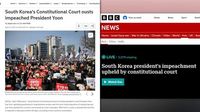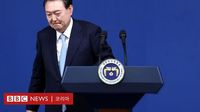On April 4, 2025, a historic decision was made by South Korea's Constitutional Court, which unanimously ruled to impeach former President Yoon Seok-yeol, marking a significant political event in the nation's history. The court, in a session that began at 11:22 AM, concluded that Yoon had violated the Constitution and laws, undermining the constitutional order and posing a serious threat to democracy.
The ruling came after a tumultuous period of 1060 days since Yoon's inauguration on May 10, 2022. The court's decision was based on an impeachment request filed by the National Assembly, which it deemed lawful. The justices found that Yoon's declaration of an extraordinary state of emergency in December 2024 was both procedurally and substantively flawed.
As a result of the ruling, Yoon is now the second South Korean president to be impeached, a distinction he shares with former President Park Geun-hye, who was removed from office in 2017. The court stated that Yoon's actions, including a controversial proclamation that mandated medical personnel return to work or face punishment, had sparked outrage among the medical community.
Following the ruling, Yoon and his wife, Kim Gun-hee, are required to vacate the presidential residence in Hannam-dong. As part of the fallout from the impeachment, Yoon will lose many of the privileges afforded to former presidents, including a significant pension and security details. The law stipulates that former presidents who are convicted of serious crimes lose most of their benefits, and Yoon's case fits this criterion.
In the wake of the impeachment, the country is now bracing for a presidential election, likely to take place on June 3, 2025. This timeline is in accordance with Article 68 of the South Korean Constitution, which mandates that a new president must be elected within 60 days if the office becomes vacant. Candidates must register with the National Election Commission by May 11, 2025, just 23 days before the election.
The political landscape is rapidly shifting as various parties prepare for the impending election. Within the ruling party, potential candidates include prominent figures such as Minister of Employment and Labor Kim Moon-soo, Seoul Mayor Oh Se-hoon, and former lawmaker Yoo Seung-min. Meanwhile, the opposition party, the Democratic Party, is rallying around its leader, Lee Jae-myung, who has seen a surge in support following his recent acquittal on election law violations.
As the political arena heats up, the implications of the impeachment are profound. The National Assembly's impeachment request was sparked by Yoon's controversial actions, including the declaration of an emergency that many viewed as an overreach of power. The court's ruling has not only removed Yoon from office but has also intensified existing political divisions within the country.
Internationally, the news of Yoon's impeachment was met with significant attention. Major foreign news outlets, including Reuters and AFP, reported extensively on the ruling, highlighting its potential to trigger further political instability in South Korea. Thousands of citizens gathered near the Constitutional Court to celebrate the verdict, signifying widespread public sentiment against Yoon's presidency.
In its ruling, the Constitutional Court emphasized that the state could not justify the use of emergency powers in this context, reinforcing the importance of constitutional governance. The court's decision is expected to have lasting effects on the political landscape, as both parties gear up for a competitive election cycle.
As South Korea navigates this pivotal moment, the upcoming election will not only determine the next president but will also serve as a referendum on the current political climate and the public's trust in governance. Analysts predict that the election will be closely contested, with both major parties vying for voter support amid heightened tensions.
The first hearing regarding ongoing investigations into alleged election interference, specifically concerning the Ulsan mayoral election, is scheduled for April 14, 2025. This investigation adds another layer of complexity to the already charged political atmosphere.
In summary, the impeachment of Yoon Seok-yeol represents a critical juncture for South Korean democracy. As the nation prepares for a new election, the implications of this ruling will resonate through the political landscape for years to come. The upcoming months are set to be pivotal as candidates emerge, policies are debated, and voters prepare to make their voices heard in the wake of this unprecedented political shift.
![[속보]'전공의 처단' 윤석열 대통령…결국 '탄핵'](https://thumbor.evrimagaci.org/wc_yXjQM012EGECF_R5xXndhPXA=/200x0/tpg%2Fsources%2F30140210-1edd-4efc-b850-8504c6c23a76.jpeg)

![[속보] 윤석열 대통령 탄핵심판 선고 시작](https://thumbor.evrimagaci.org/7R7PcB372nMraiERXCaLjSW5Kig=/200x0/tpg%2Fsources%2F7f36b183-7a95-4526-b02c-bfc2431d9fe5.jpeg)

![윤석열, 탄핵심판 ‘파면’ 선고에도 묵묵부답일까 [4월4일 뉴스뷰리핑]](https://thumbor.evrimagaci.org/YtFWZ6hb1QKwIzmVlC8d-uKhbjg=/200x0/tpg%2Fsources%2F5eea2a93-86f1-47e6-9c5a-d0511385535e.jpeg)



